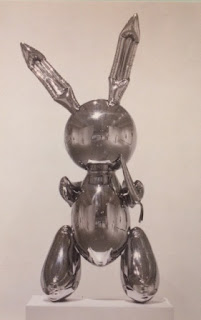Stainless steel sculpture [1]
I.
D. H. Lawrence famously contrasted the shape and surface of a peach with that of a billiard ball; privileging the former, velvety and wrinkled with secrets, over that of the latter, so round and finished but lacking in voluptuous beauty for all its smooth perfection [2].
Clearly, for Lawrence, this is an erotico-aesthetic issue; he doesn't like the look or feel of the billiard ball as an object and regrets that it doesn't have the indentation or groove of the peach running along its body; the ripple down the sphere with the suggestion of incision [3].
II.
Byung-Chul Han is another writer who doesn't much care for smoothness and he not only perceives a connection between Brazilian waxing, the iPhone, and the sculptures of Jeff Koons, but objects to all these things on politico-philosophical grounds.
Speaking in conversation with Niels Boeing and Andreas Lebert in 2014, Han explained why he sees similarities between these things and why the ideal of smoothness troubles him:
"The commonality isn't that difficult to see: it is the smooth. Smoothness is characteristic of our present. Do you know the G Flex, a smarthone by LG? This smartphone has a special covering. If it gets scratched, the scratch quickly disappears. That is, it has a self-healing skin, almost an organic skin. The smartphone therefore remains perfectly smooth. I ask myself: What is the problem with an object getting a few scratches? Why this striving for a smooth surface? And straightaway a connection opens up between the smooth smartphone, smooth skin, and love." [4]
Han continues:
"The smooth surface of the smartphone is a skin that cannot be damaged, that can avoid any injury. And isn't it the case that today we seek to avoid any kind of harm in love as well? We do not want to be vulnerable; we shy away from hurting and from being hurt. [...]
[...] Even art seeks to avoid injury. There is no damage to be found on a Jeff Koons sculpture - no tears, no fault lines, no sharp edges, no seam either. Everything flows in soft and smooth transitions. It all appears rounded, polished, smoothed out - Jeff Koons's art is dedicated to the smooth surface." [5]
III.
What, then, do I think of this?
Well, on the one hand, I quite agree that it's often the irregularities and imperfections that make things (including people) lovable and longtime readers will know that I subscribe to a gargoyle aesthetic [click here, or here, for example], which means I challenge all ideas of wholeness, or completion, or smooth perfection. The devil - which is to say the seductive charm - is always in the detail.
On the other hand, I've also indicated in past posts that I'm a fan of the work of Jeff Koons [click here, or here, for example], have written on the beauty and genius of the iPhone [click here], wear spectacles with anti-scratch lenses, and prefer girls with legs that are silky smooth, rather than rough and hairy [6].
So let's just say I'm a little more ambivalent on this question than Han ...
Notes
[1] Koons had three identical stainless steel rabbits made in 1986. One of these figures sold for over $91,000,000 in May 2019, making it the most expensive work sold by a living artist at auction.
[2] See D. H. Lawrence, 'Peach', in The Poems, Vo. I, ed. Christopher Pollnitz, (Cambridge University Press, 2013), p. 232. The poem can be found on the Poetry Foundation website: click here.
I'm aware of the fact that were one to closely examine a billiard ball one would find that it is neither perfectly round nor perfectly smooth, despite being machine manufactured and cast in resilient plastic materials. It might look (to the naked eye) and feel (to the poet's fingertip) absolutely smooth, but there are numerous micro pits, bumps and scratches on the surface of a billiard ball.
[3] One is reminded reading this that, for Lawrence "fruits are all of them female" and that he cannot help relating the body of the fig, peach, or pomegranate to the body of woman and her sexual organs. See The Poems Vol. I, p. 229.
This metaphorical comparison between fruit and sex is of course long established in the arts; it is, in fact, something of a cliché for (predominantly male) poets and painters to compare breasts to
melons, nipples to dark cherries, and moist cunts to ripe figs
showing crimson through the purple slit, as D. H. Lawrence would have it. I comment at greater length on this elsewhere on Torpedo the Ark; click here for example, or here.
[4] Byung-Chul Han, 'I Am Sorry, But These Are the Facts', in Capitalism and the Death Drive, trans. Daniel Steuer, (Polity Press, 2021), pp. 125-26.
[5] Ibid., p. 126.
Note that Byung-Chul Han sets out his thinking on smoothness (in relation to the body and to aesthetics) in Saving Beauty, trans. Daniel Steuer, (Polity Press, 2018). See the first three chapters in particular.
[6] Having said that, in one of the earliest posts on this blog (8 Jan 2013), I wrote with regret about the universal Brazilianization of women obliged by porno-social convention to wax or shave their pubic region and recalled the words of Henry Miller to the effect that a hairless cunt lacks mystery and resembles a dead clam (one assumes that Byng-Chul Han would agree with this). Click here if interesed in reading the post in full.









